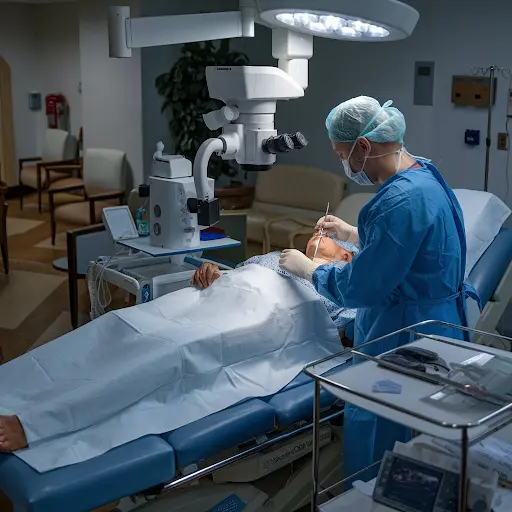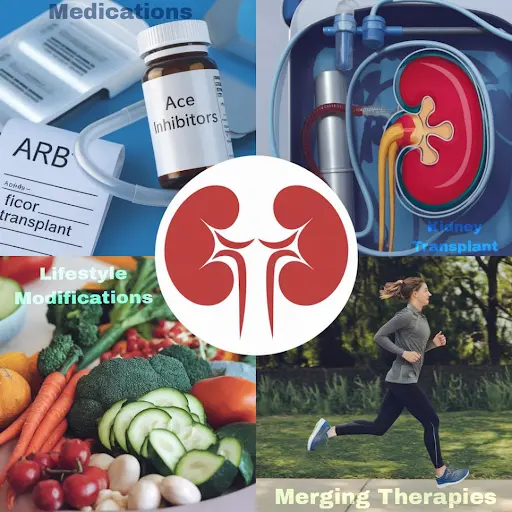Intervention in CKD
- Home
- Intervention in CKD
Chronic Kidney Disease (CKD) is a progressive condition that affects the kidneys’ ability to filter waste, excess fluid, and maintain electrolyte balance. As CKD advances, it can lead to kidney failure, requiring treatments like dialysis or a kidney transplant. Early intervention plays a key role in slowing disease progression, preserving kidney function, and improving the quality of life. This article covers the causes, symptoms, treatment options, and the latest advancements in CKD management.
Causes of CKD
CKD can result from various underlying conditions, and identifying these causes is crucial for effective treatment and prevention. The main causes include:
- Diabetes: High blood sugar damages kidney blood vessels, leading to impaired kidney function.
- Hypertension: Chronic high blood pressure strains the kidneys, damaging blood vessels and reducing kidney function.
- Glomerulonephritis: Inflammation of the kidneys’ filtering units can result from infections, autoimmune diseases, or genetic disorders, impairing kidney function.
- Polycystic Kidney Disease (PKD): PKD is an inherited condition where cysts form in the kidneys, causing progressive damage.
- Obesity: Obesity contributes to CKD by exacerbating diabetes, hypertension, and high cholesterol, which put additional strain on the kidneys.
- Other Factors: Recurrent kidney infections, kidney stones, certain medications, and genetic predispositions can also contribute to CKD.

Symptoms of CKD
Early-stage CKD may not have noticeable symptoms, making regular check-ups essential for early detection. As the disease progresses, common symptoms include:
- Swelling (Edema): Fluid retention causes swelling in the legs, ankles, and face.
- Fatigue: Reduced kidney function leads to the accumulation of waste products, causing tiredness and weakness.
- Frequent Urination: CKD can lead to increased urination, especially at night.
- Shortness of Breath: Fluid buildup in the lungs may cause breathing difficulties.
- Itchy Skin: Waste accumulation in the body can lead to dry, itchy skin.
- Blood in Urine: Hematuria (blood in urine) can indicate kidney damage from infections, stones, or glomerulonephritis.

Benefits of Early Treatment
Early diagnosis and intervention are critical in managing CKD and preventing complications:
- Slows Disease Progression: Managing diabetes, hypertension, and other risk factors early can slow CKD’s progression and preserve kidney function.
- Prevents Dialysis: Timely treatment may help delay or avoid the need for dialysis, allowing patients to live without it for years.
- Improves Quality of Life: Managing CKD symptoms, such as swelling, fatigue, and shortness of breath, improves a patient’s quality of life.
- Cost-Effective: Early intervention reduces the need for expensive treatments like dialysis and transplants, lowering healthcare costs.
Latest Treatment Techniques for CKD
Several treatments are available for managing CKD, ranging from medication to lifestyle changes. Some key treatment methods include:
1. Medications:
- ACE Inhibitors and ARBs: These medications help lower blood pressure and protect kidney function by reducing protein leakage in urine.
- Diuretics: These help remove excess fluid from the body, reducing swelling and fluid buildup in the lungs.
- Erythropoiesis-Stimulating Agents (ESAs): Used to treat anemia in CKD patients by stimulating red blood cell production.
2. Dialysis: :
For patients with severe CKD, dialysis is necessary to filter waste and excess fluid from the body. There are two main types
- Hemodialysis: A machine filters blood to remove waste and excess fluids.
- Peritoneal Dialysis: A fluid is introduced into the abdominal cavity to absorb waste products before being drained.
3. Kidney Transplant:
A kidney transplant replaces diseased kidneys with a healthy one from a donor. A successful transplant allows for the restoration of normal kidney function and a better quality of life.
4. Lifestyle Modifications:
- Dietary Changes: Reducing salt, protein, and potassium intake can reduce the burden on the kidneys.
- Exercise: Regular physical activity helps control blood pressure, blood sugar, and weight, which are important for managing CKD.
5. Emerging Therapies:
- Gene Therapy: Gene editing techniques may eventually provide treatments for genetic kidney diseases, such as PKD.
- Stem Cell Therapy: Research into stem cells offers potential for regenerating kidney tissue, presenting hope for future treatments.
Conclusion
Chronic Kidney Disease is a serious condition, but early intervention can slow its progression and prevent complications. By managing risk factors like diabetes and hypertension and adopting a healthy lifestyle, patients can preserve kidney function for longer. With the right treatment plan, it’s possible to improve quality of life and avoid costly and life-altering treatments such as dialysis and kidney transplants.
Frequently Asked Questions (FAQs)
A1. Preventing CKD involves regular health check-ups to monitor kidney function, managing blood pressure and blood sugar, maintaining a balanced diet, staying active, and avoiding smoking.
A2. Early signs include changes in urination, swelling in the legs or face, fatigue, and back pain. If these symptoms appear, seek medical advice promptly.
A3. CKD cannot be reversed, but with early diagnosis and treatment, its progression can be slowed, and complications can be avoided.
A4. Dialysis is typically required when kidney function falls below 15% of normal. Your healthcare provider can assess kidney function through blood tests.
A5. Follow your prescribed medication regimen, adopt a kidney-friendly diet, maintain regular physical activity, and attend follow-up appointments to monitor kidney function.

Would you like to request an appointment?
You can call on +91-98200 86520 for Appointments or fill the form below
If you’re concerned about your kidney health or at risk for CKD, consult a healthcare provider today. Early intervention is the key to preserving kidney function and improving quality of life. Schedule your consultation now and take control of your kidney health.
